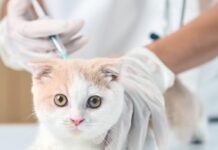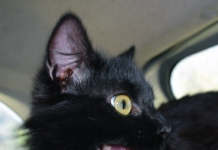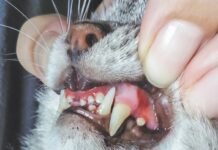Question: I have three cats that I love dearly, Bandit, Branigan, and Snowball. Snowball is a new addition to the family, so we dont yet know how quickly plaque and tartar will build up on her teeth. But Branigans teeth need to be cleaned every six months and Bandits once a year. My concern is the amount of anesthesia they will receive in a lifetime. I have a feeling that it is not good for them.
Answer: There is no such thing as a risk-free medical procedure, so virtually every veterinary medical decision involves consideration of both the benefits and the risks of performing the procedure, balanced against the benefits and risks of not performing the procedure. This is true whether were talking about vaccinations, surgery, medication, flea preventative formulations, car trips to the veterinarian, blood sample collection – the list goes on and on.
An ounce of prevention
In your kitties case, the question can be summed up like this: Do the benefits of performing the preventative dental work outweigh the risks of the procedure – in particular, the risks of the required general anesthesia? Faithful readers of CatWatch are well aware of the need to maintain their cats oral health, and this includes regular veterinary examinations and periodic removal of plaque and calculus. (Calculus forms at different rates depending, at least in part, on the kitty.
Some cats require more frequent cleanings than do others: note the differing needs of Bandit and Branigan.) Plaque leads to calculus, which leads to gingivitis, which leads to periodontal disease with its resultant adverse effect on general health. The benefits of regular dental prophylaxis are unquestionable.
Are the risks overstated?
But what about the risks associated with anesthesia? Thankfully, todays anesthetic agents and techniques are remarkably safe. Recent studies show that on average, fewer than 1 in 2,000 cats undergoing anesthesia succumb during or immediately after being anesthesized – a figure roughly comparable to that in humans. Nonetheless, veterinarians are extremely careful with cats under anesthesia. Often, diagnostic tests are recommended prior to the procedure to make sure that all the cats systems are capable of dealing with it. In addition to hands-on monitoring (e.g., evaluation of gum color and refill time, respiratory depth, muscle tone, etc.) while the patient is anesthetized, veterinarians often employ a number of sophisticated monitors that keep track of heart rhythm and rate, respiration, blood pressure, and more depending on the needs of the patient and the equipment available in the hospital.
Good news
Thats all good news, but what about the risk of repeated anesthesia over the course of a cats life? Might each succeeding anesthetic episode be more likely to lead to complications during the procedure? Or might the anesthetics lead to other problems, like cancer or heart disease? Im happy to report that the answer is no on both accounts. There are no known risks associated with frequent anesthetic administration to cats. The health benefits of maintaining your three friends oral health far outweigh the risks of repeated anesthetic administration.



